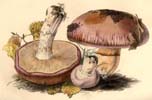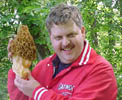Edward Adolf Strasburger (1844 - 1912)
Back to Author Index
Biography
Sources
Other Web Sources
Biography
Strasburger was an awesome dude. He was one of the people that everyone wanted to study with in Europe. In fact, I included him at first because of that reason, but when I checked more carefully, it seems that most of the mycologists who went to Europe actually studied with de Bary; the only ones who studied with Strasburger were William Chambers Coker and Robert Almer Harper; his other students were more general botany types, like James Ellis Humphrey and Walter Tennyson Swingle. Isley mentions a Duggar who studied with him, but I (so far) haven't found a mention of any such episode in the life of Benjamin Minge Duggar, profiled on this site. Strasburger, in turn, was a student of Nathanael Pringsheim, among others.
Although he didn't make any personal contributions to mycology, Strasburger is important to just about any biological field in his own right. His dissertation made the then-strange assertion that the cell nucleus divides when the cell does, instead of just disappearing and reforming later. He furthermore is the person who identified the chromosomes as conveyors of heredity. And when zoologists made similar discoveries, he hailed the similarities in cell division as evidence that plants and animals shared a common evolutionary origin. This was pretty way out in those days, when Darwin's theory was still quite controversial.
Another controversy of the day was what (if anything) the sperm cell contributed to the embryo. His finding that it was the chromosomes (and only the chromosomes) of each sex cell that contributed to the heredity of the offspring laid this controversy to rest. Along the way, he worked out how the gametes were generated (meiosis), and coined the terms "haploid" and "diploid" to describe them.
He made many other contributions to the basic biology of phanerogams, working out the details of pollination in great depth and addressing other aspects of cell biology. The terms "chloroplast" and "cytoplasm" also come from him.
Sources
Duane Isley (1994) One Hundred and One Botanists
Back to top
Other Web Sources
Strasburger - Encyclopedia Britannica
Back to top











